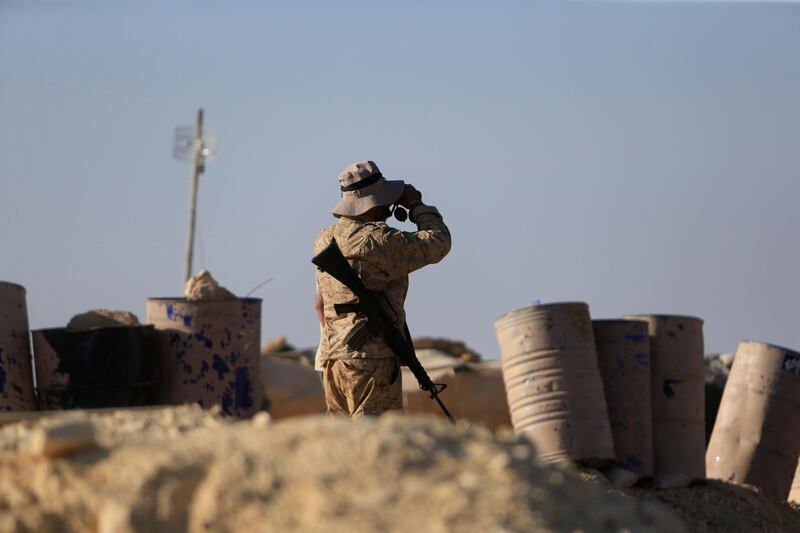Hizbollah recently pushed the Al Qaeda affiliate, Hayat Tahrir Al Sham, commonly known as Jabhat Fatah Al Sham but since rebranded, out of Lebanon's border region with Syria, near the town of Arsal. This led to criticism from the United States and Europe, where officials felt it was the Lebanese army's role, not Hizbollah's, to conduct such an operation.
The episode revived a long-standing debate over the role of the army in Lebanon. The collaboration between the army and Hizbollah in the Arsal operation led some in the United States to argue in favour of cutting off all military aid to the institution under the pretext that Hizbollah is an Iranian proxy. Lebanese officials, including prime minister Saad Hariri, were markedly uncomfortable, noting that they would have preferred that the army expel Hayat Tahrir Al Sham.
_____________________
Read more:
[ Nearly 8,000 Al Nusra militants, refugees leave Lebanon to Syria ]
[ More Syrian refugees leave Lebanon, but are they heading into the path of air strikes? ]
[ Hizbollah chief says ready to battle ISIL on Lebanon-Syria border ]
_____________________
It is undeniable that the army and Hizbollah collaborated around Arsal, just as they have on numerous other occasions in Lebanon. In many regards, each is an immovable object in the Lebanese landscape and it is not surprising to see them search for a modus vivendi, as neither can eliminate the other without destroying Lebanon in the process.
Therefore, the proposal of cutting military aid is not, in itself, unjustified if one were to stick to a strict reading of Washington’s stated interests. However, interests are sometimes difficult things to define, as the US knows all too well for having collaborated with Iranian proxies while fighting ISIL in Iraq. Nor has the Trump administration threatened to suspend military aid to Baghdad, whose prime minister declared just last week his refusal to dissolve the pro-Iran Popular Mobilisation Forces.
There are generally two broad approaches governing views of the Lebanese army today. One holds that Lebanon has already fallen to Hizbollah and Iran, so there is nothing to be lost by ending support for the army and the state.
Another more nuanced view, however, is that Lebanon is a complex place. While Hizbollah is strong, a significant share of the population, perhaps a majority, opposes its military independence and alliance with Iran. Because little can be done against the party without risking civil war, it is best to manage the relationship until the balance shifts and the state can regain the upper hand.
_____________________
Also read:
[ Hizbollah strengthens its position in Lebanon with military successes ]
[ Lebanon's executive power is hijacked by Hizbollah ]
_____________________
Proponents of this second view further argue that any cut-off of aid to the army would only benefit Hizbollah, whose political project is built on undermining the state and its institutions to better justify its own parallel mini-state. By isolating the Lebanese army and government, therefore, Washington would only strengthen Hizbollah and undermine those outposts in the army, the political class and society opposing the party.
Lending some truth to this is the reality that the Lebanese army is a house of many mansions – an institution where different centres of power, allegiances and networks co-exist. A large number of soldiers are Sunni, therefore hardly Hizbollah admirers. Hizbollah has influence over key branches, including military intelligence and administrative bodies that decide on promotions, but to understand the institution better, one has to see it as a constant compromise between its different power centres.
That is why it is not quite accurate to say that the army is pro-Hizbollah. Rather, the attitude of collaboration with Hizbollah represents a convenient equilibrium between the army’s diverse power centres, just as the political interactions with the party in government represent a convenient balance between Lebanon’s many political forces.
That subtlety may be too much for those who insist that it is not the business of the US to fund an institution that coordinates with its enemies. But that’s not quite the issue. The issue is whether the US gains by fostering spaces – in the army above all – where opponents of Hizbollah might manoeuvre, if not to neutralise the party’s actions, at least to make them more politically costly, showing that Hizbollah cannot consistently ignore those Lebanese who disagree with it without risking a backlash.
The interplay between the state and Hizbollah is invariably complicated. The party does not have the means to take over the state, so it seeks to control its commanding heights. That implies that it must frequently compromise with state institutions to advance its own cause. In some cases, that may mean ceding ground to government institutions, albeit never in a way that might fundamentally shift power away from the party.
Yet such dynamics point to a reality that Hizbollah and its supporters in the Shiite community feel vulnerable, like all those Lebanese communities who tried to impose their domination on the country in the past. In a sectarian system like Lebanon's, it is always possible that your foes might unite against you, a lesson the Syrians learnt to their detriment in 2005 after the assassination of former prime minister Rafik Hariri.
In this context, it is worth thinking twice about halting military support for the Lebanese army. Such a move might only reinforce Hizbollah, while abandoning those who reject the party’s autonomy and pro-Iran agenda. Nor is it enough to say that these are not America’s problems. If Washington aims to contain Iran, it is the details that will count.
Michael Young is a writer and editor in Beirut





